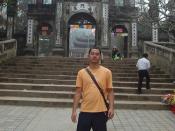Paradise of the Blind, written by author Duong Thu Huong, describes a 20-year old Vietnamese woman, Hang, in the 1980s on a train ride to Moscow. She reflects on her past, and has flashbacks of her life in Vietnam at the time of the Communist reign. Throughout the novel, Huong describes these events using the help of different motifs. One such motif is the use of fire. Using a variety of diction, interior monologue, and sentence structure, Huong uses the motif of fire in Paradise of the Blind to emphasize HangÃÂs change in opinion towards familial bonds as she matures into an adult.
Fire-related diction contributes to how Hang feels about familial bonds. As a child, Hang succumbed to the authority of her family, especially her mother and Aunt Tam, even though she may have disagreed to a certain degree. On page 100, her mother and Aunt Tam are building an altar in memory of HangÃÂs father.
She says, ÃÂI went outside...and lit a sparkler. I watched it flicker in my hand. With the money Aunt Tam had given me, I could buy myself a whole paper house of firecrackers. But for me, there was no joy. Even the air here seemed to shiver with faded voices and unfulfilled promises.ÃÂ (Huong 100) She feels that life has too many ÃÂunfulfilled promisesÃÂ, that there is basically no point in hoping for change. The ÃÂflickerÃÂ of a ÃÂsparklerÃÂ represents a weak form of fire that is premature and lacking in intensity. This shows that at this point in time, her hope for change to break from this familial bond is very weak. She does not actually have the ÃÂflameÃÂ to create this type of revolt. More importantly, though, is the use of the word ÃÂfirecrackersÃÂ in contrast with HangÃÂs ÃÂsparklerÃÂ. Firecrackers suggest a more powerful form of fire. By using firecrackers to show the amount Aunt Tam could afford for Hang, Huong shows that Aunt Tam supports Hang and her desire to break the familial bond with her mother. Yet, Hang said, ÃÂthere was no joy.ÃÂ and, at that age, she does not believe in breaking a bond with her mother.
However, as Hang grows up, she does not detest fire; she longs for it. Huong again uses fire-related diction, so we can see how Hang changed in her views toward familial bonds. In this passage, when Hang is describing the feeling emitted by a song, she feels that the singer ÃÂmust have suffered, seen her hopes snuffed out, her passions ground to ash.ÃÂ (Huong 39) The word ÃÂsnuffedÃÂ is used to describe the life of the singer; yet in most cases, ÃÂsnuffedÃÂ is used to describe the blowing out of a candle or match, creating a loss of fire. ÃÂAshÃÂ shows an end state of a ÃÂsnuffed outÃÂ fire, and therefore, passion ground to ash is what happens to a ÃÂsnuffed out lifeÃÂ. Hang explains these descriptions in a negative way, stating that this loss of fire proves the singer ÃÂmust have sufferedÃÂ from loss of hope and passion to revolt against the current state of things. Having this fire would have allowed the singer to change her life, and break free from whatever chains are pulling her back. The fire in HangÃÂs own heart guides her to revolt against her own chains. Through diction, we know that Hang treats fire as a desire and not a burden, which can lead one to believe in her change of view in familial bonds - from a state of obedience to a state of revolt.
Another way the author uses the motif of fire throughout her passages is through the use of interior monologue. This is a way of expressing a characterÃÂs inner feelings towards a certain issue. When Hang is small, she expresses a kind of ÃÂloathingÃÂ for fire. Whenever her mother or Aunt Tam creates a fire for her, she expresses inner guilt and shame. For example, on page 99, Huong wrote, ÃÂ[Aunt TamÃÂs] eyes flashed at me, as if the vision of my future liberated her from her suffering and humiliation. I couldnÃÂt find words to speak to her anymore, so I turned away.ÃÂ (Huong 99) She expresses an inner thought that she could no longer find words to speak to Aunt Tam. The use of ÃÂflashedÃÂ may show a spark in her eye that relates to the way a fire is started. Hang expresses that the vision of her own future is what relieves Aunt Tam from her pain. The pain Aunt Tam feels is due to the way the communist party had treated her, and she feels humiliated from it. She did not revolt against this, but merely endured communism into her life. Now, as Aunt Tam realizes and regrets this lack of fire she had before, she sees Hang following through with this path of revolt, either it be on the familial scale, or the national and political scale. Yet, Hang ÃÂ[turns] awayÃÂ from Aunt TamÃÂs fiery gaze, maybe because Hang herself feels humiliated at having the thought to revolt against family (i.e. her mother). It is ironic how Aunt Tam and Hang felt humiliated by totally opposite reasons.
As Hang grows older though, the use of interior monologue changes. Huong wrote, ÃÂ[The singer] too must have known this weariness, this despair. Like us, she must have had to reinvent hope and a yearning for life. The song crackled forth like the wing of a bird lost in the limitless blue of space, like a spark from an inferno.ÃÂ (Huong 39) This passage showed the relationship Hang felt she had with the singer. With the use of ÃÂtooÃÂ and ÃÂLike usÃÂ, Hang shows that both of them share the same despair in life. The ÃÂspark from an infernoÃÂ shows up as being a way to ÃÂreinvent hope in lifeÃÂ - to break down the barriers that pull us back from our desires. One thing to notice is that Huong wrote, ÃÂthis weariness, this despair.ÃÂ instead of simply ÃÂweariness, despairÃÂ. This confirms the relationship between the singer and Hang even more, and showed that all this suffering by the singer can all be related to Hang. She desires to have a spark from that inferno, so that she could reinvent hope in her own way. That ÃÂsparkÃÂ is most likely directed to revolting against the familial bonds she has with members that pull her back from her desires, which is Uncle Chihn.
A third way in which Hang expresses her opinion towards familial bonds is through the sentence structure. Again, there is a difference between the passages when Hang is a child and when she matures into a woman. When she is a child, the sentence structure of fire-related sentences are very simple, short, and direct. Huong uses this sentence structure to emphasize the simplicity of HangÃÂs view towards familial bonds at the time. For example, in page 100 and 101, Hang describes the following: ÃÂCandle blazed. Firecrackers snapped, echoing in the distance.ÃÂ (Huong 100) and ÃÂthe red and white candles, the sticks and crowns of incense...ÃÂ (Huong 101) These two sentences show only simple observations, which may relate to HangÃÂs lack of maturity to the complexity of familial bonds. All she knows now is that it is morally wrong to break these bonds.
When Hang is an adult, the sentence structure relating to fire also shows her opinion towards familial relations. She has a great desire to break out of these bonds to change her life for the better. Sentences with asyndeton are most often used in the passage. For instance, ÃÂLike a sudden downpour, a vision of endless mountain ranges, dense forest, fields set ablaze, nature unleashed.ÃÂ (Huong 38) The sentence structure is grammatically incorrect. It may be HuongÃÂs way of showing a unique metrical foot. Huong does not want to use natural meter in this passage because she wants to emphasize the change in HangÃÂs characterization. In this sentence, it shows fire spreading uncontrollably. Since an uncontrollable fire may be due to a sudden great burst of fire, it may represent HangÃÂs thirst for revolt throughout her life - even when she was a child, and gradually building up as she matures. Hang says, ÃÂLike a call, it beckoned me to a kind of love - to revolt, the most essential force in human existence. I wrapped my arms around myself and huddled in a corner of the compartment. If only my mother could feel this revolt, if only her heart could gather a spark from this inferno.ÃÂ (Huong 38) These final sentences summarize HangÃÂs feeling of fire throughout the novel. Even when she was small, she had that ÃÂspark from this infernoÃÂ. After all, as Hang said, it is ÃÂthe most essential force in human existenceÃÂ; the force to change for the better. The asyndeton in the final sentence emphasizes the longing in which she wants her mother to feel this ÃÂsparkÃÂ. If she did, she could have broken from the chains of her brother, Uncle Chihn, who was a burden to Hang and her mother, and the reason for their poverty and unhappiness. A more subtle sentence from the above is ÃÂI wrapped my arms around myself and huddled in a corner of the compartment.ÃÂ It is as if Hang is trying to have every bit of warmth to create a spark within herself. This shows to what extent she is willing to go to find this inferno.
The representation of fire actually stays the same throughout the novel: to revolt and change for the better. It is the way fire is used in different passages that emphasizes HangÃÂs change in opinion towards this idea of revolt. When she was small, she believes that family should always be first priority, but yet, she matures into a woman who revolts against all bonds that pull her back from her desires in life. Although she is not fully free from these bonds, at the end of the novel, we know she refused to help Uncle Chihn with his import-export business, and decided to sell the house of her ancestors. This is the only way Hang believes she could break out of these bonds to start a new life - a new life in search for her desires.
BibliographyThe novel Paradise of the Blind written by Duong Thu Huong

